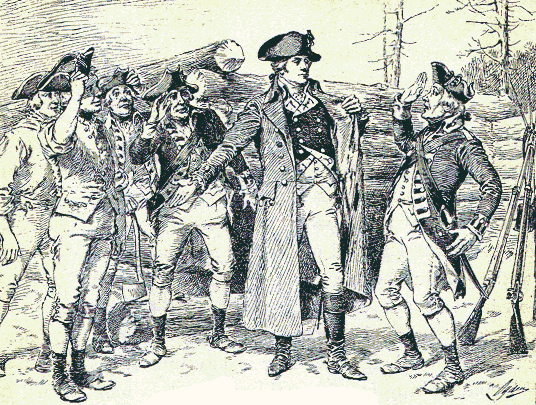Story of the Thirteen Colonies - Helene Guerber |
The Boston Boys
The news of the battle of Bunker Hill, and of Howe's setting fire to Charlestown during the struggle, was sent without delay to Congress. The messenger who bore it met Washington on his way to Cambridge to take command of the army. The general in chief eagerly asked how the Americans had behaved, and when he heard that they had stood their ground bravely, he fervently cried: "The liberties of the country are safe!"
The messenger then continued on his way, and when the news reached Congress there was great excitement. The patriots felt that the fight could now end only when their rights were assured; and Franklin wrote to some friends in England: "England has lost her colonies forever."
Riding on, Washington quickly reached Cambridge, where he made his headquarters in the house later occupied by the famous American poet Longfellow. In the beginning of July, 1775, standing under the Cambridge Elm, Washington took command of the continental army, composed of about fifteen thousand men of every age and size. They were armed with hunting rifles, knives, swords. or pitchforks; most of them had no idea of military drill or discipline, and all were in need of arms, ammunition, uniforms, and food.
![[Illustration] from Story of the Thirteen Colonies by Helene Guerber [Illustration] from Story of the Thirteen Colonies by Helene Guerber](https://heritage-history.com/books/guerber/thirteen/zpage242.gif) THE CAMBRIDGE ELM. |
It was impossible to fight without three of these things; so while the patriots brought food for the soldiers, Washington bestirred himself to secure arms and ammunition, begging Congress to supply hunting shirts, so that his army might present a more orderly appearance. To prevent the enemy from discovering, through spies, that he had less than half a pound of powder for each man, Washington had a number of barrels filled with sand. A little powder was put on top of each, and they were stored away and guarded as carefully as if there were the greatest danger of their exploding at any minute.
While waiting for the artillery which Ethan Allen had secured at Ticonderoga to be brought across country on ox sleds, Washington and his aids drilled their ungainly troops. But the patriots were independent and hard to manage. It is said that when a corporal once bade a private get a pail of water, the latter coolly answered: "I won't. Get it yourself. I got the last pail; it is your turn now."
The officers, on the other hand, seemed afraid to lower themselves by doing any work. Washington, hearing a corporal urge his men to remove a log which was too heavy for them, suggested to the corporal that in such cases it was well to lend a hand. But the man proudly answered: "Do you realize that I am a corporal?" Feeling that example would be better than preaching, Washington dismounted, lent a vigorous hand to the men, and, when the log was in place, showed them his uniform and rode off, bidding the men call for him whenever they needed help.
We are told that on another occasion he found some Marblehead fishermen and Virginia riflemen quarreling. Unable to bring them to order in any other way, Washington, who was more than six feet tall and very strong, strode into their midst, and, seizing the noisiest by their collars, shook them until he brought them back to their senses.
 WASHINGTON AND THE CORPORAL. |
For eight months Washington waited and drilled, keeping the British shut up in Boston. Here the officers tried to kill time by writing and acting plays, and it is said that the most clever of all these productions was a work by André making fun of Washington. The British soldiers, having nothing to do, annoyed the citizens, and so often spoiled the children's play on the Common, that a number of big boys finally went to General Gage to complain about it.
The British general angrily asked: "What! Have your fathers sent you here to exhibit the rebellion they have been teaching you?" But the boys bravely answered: "Nobody sent us. We have never injured your troops, but they have trampled down our snow hills and broken the ice of our skating pond. We complained, and they called us young rebels, and told us to help ourselves if we could. We told the captain, and he laughed at us. Yesterday our works were destroyed for the third time, and we will bear it no longer."
The boys' spirited reply could not but appeal to General Gage, who said to some people standing near him: "The very children draw in a love of liberty with the air they breathe." Then, turning to the boys, he added: "Go, my brave boys, and be assured that if my troops trouble you again they shall be punished."